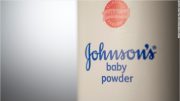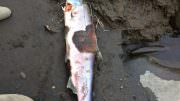SACRAMENTO – An uptick in the filing of class-action lawsuits stemming from a study linking talc to ovarian cancer can be largely traced to advertisements aired by personal injury attorneys in the wake of a recent verdict, according to Julie Griffiths of California Citizens Against Lawsuit Abuse (CALA).
Johnson & Johnson was recently hit with a $72 million verdict in a case filed by the family of an Alabama woman who died because her use of the company’s baby powder and talc-based feminine hygiene products allegedly led to ovarian cancer.
“The lawsuits are ramping up because the attorneys are airing misleading ads claiming that anyone signing up for this lawsuit have a real shot at a $72 million dollar settlement as well,” Griffiths told the Northern California Record. “Really, the whole thing from our perspective are these ads, for this case. They are playing all over satellite radio.”
Johnson & Johnson Consumer spokesman Carol Goodrich said in a statement that the company would appeal the jury verdict entered in the judicial court for the city of St. Louis.
A study reported in May by the American Association for Cancer Research revealed that use of body powders containing talc by African-American women increased their risk of getting ovarian cancer in comparison with those who did not use talc.
The study, entitled “Association Between Body Powder Use and Ovarian Cancer: the African-American Cancer Epidemiology Study,” said previous studies showed that use of genital powder increased the risk of ovarian cancer, but that those results had “not been thoroughly investigated in African-American women, a group with a high prevalence of use.”
The study involving African-American women found that powder use was prevalent in these women. The study also revealed an association between powder use and upper respiratory conditions, suggesting that an enhanced inflammatory response may explain the association between body powder and ovarian cancer.
Some cancer genetics experts have warned women to stay away from talc-containing powders for decades. However, Goodrich said “the jury’s decision goes against 30 years of studies by medical experts around the world that continue to support the safety of cosmetic talc.”
“Multiple scientific and regulatory reviews have determined that talc is safe for use in cosmetic products and the labeling on Johnson’s Baby Powder is appropriate,” Goodrich said.
Johnson & Johnson said two widely accepted studies, including one published in 2009 by the Harvard School of Public Health and another published in 2014 by the U.S. National Institutes of Health, found no association between talc and ovarian cancer. The company said various governmental and non-governmental agencies and other expert panels have also reviewed and analyzed all available data, “and none have concluded that talc can cause cancer.”
“It is natural for trial verdicts to raise questions about the product involved, and it’s also important to distinguish jury verdicts – in the United States – from regulatory rulings or rigorous scientific findings,” Johnson & Johnson said.
Griffiths said CALA supports restrictions on personal injury lawsuit ads “that promise fortunes and clog up our court systems.”
“Lawsuit abuse trends are rampant in California and continue to grow,” Griffiths said. “Our motto is always justice, not greed.”
Source: norcalrecord.com




